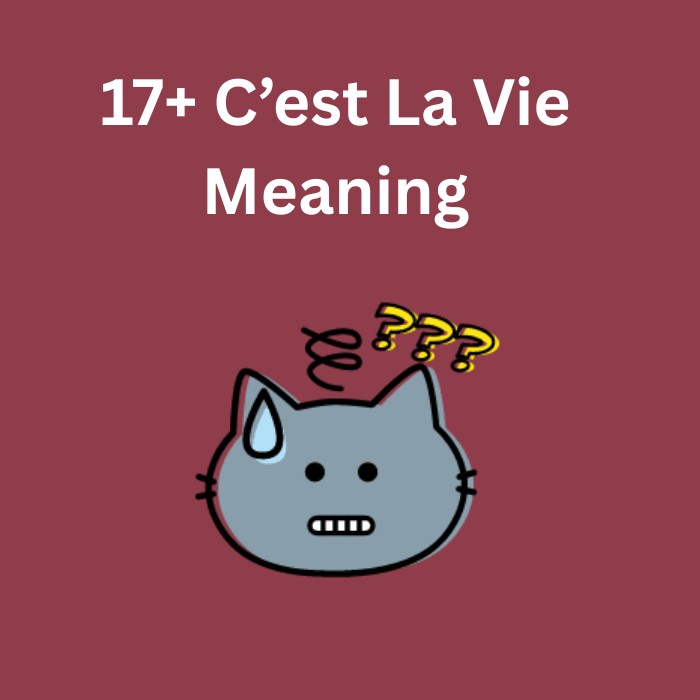17+ C’est La Vie Meaning: Exploring Polite, Professional, and Casual Alternatives

Life is filled with moments where acceptance becomes necessary, and understanding the phrase “C’est la vie” can greatly enhance our communication. This French expression, which translates to “that’s life,” encapsulates a philosophy of embracing life’s ups and downs.
Whether you’ve seen it spelled ce la vie meaning, or in its correct form, c’est la vie, it remains a timeless way to express acceptance. In this guide, we’ll explore 17+ polite, professional, and casual alternatives to help you say the same thing in different ways, tailored to your tone and audience.
List Of Ce La Vie Meaning

- Acceptance of life’s unpredictability
- Embracing life’s ups and downs
- A reminder to enjoy the moment
- A philosophical approach to setbacks
- Recognition that not everything is within our control
- An invitation to let go of frustrations
- A cultural expression of resilience
- A call to appreciate the journey, not just the destination
- An affirmation of living in the present
- A gentle nudge to find humor in adversity
- A way to express indifference towards trivial issues
- Encouragement to focus on what truly matters
- A celebration of spontaneity and adventure
- An acknowledgment of the impermanence of experiences
- A mantra for moving forward after disappointment
- A reminder that life is a mix of joy and sorrow
- An expression of nonchalance towards minor inconveniences
- A philosophical lens through which to view challenges
- An encouragement to cultivate gratitude for life’s moments
What Does “C’est la Vie” Mean?
The phrase “C’est la Vie” is a French expression that translates to “That’s life” in English. It encapsulates the idea of accepting life’s ups and downs with a sense of resignation or philosophical acceptance.
- Acceptance of Reality: At its core, “C’est la Vie” emphasizes the importance of acknowledging reality as it is.
- Coping Mechanism: This expression often acts as a coping mechanism for those facing setbacks or misfortunes.
- Cultural Reflection: Beyond its literal meaning, “C’est la Vie” reflects a broader cultural attitude toward life in French society.
Read also 13+ WYA Meaning in Text: Understanding and Alternative Ways to Say It
The Tone and Context of C’est la Vie
The Tone and Context of C’est la Vie can vary significantly depending on the situation in which it is used. Here are some key contexts in which this phrase commonly appears:
- Acceptance of Misfortune: Often employed when acknowledging that life’s disappointments are inevitable, “C’est la Vie” serves as a reminder to embrace reality rather than resist it.
- Light-hearted Resignation: In more casual settings, the phrase can be used humorously to deflect minor setbacks, suggesting that one should not take life too seriously.
- Philosophical Reflection: The phrase can also signal a deeper philosophical acceptance of life’s complexities, prompting individuals to reflect on the unpredictability of existence.
- Cultural Expression: In French culture, “C’est la Vie” encapsulates a certain joie de vivre, emphasizing an approach to life that values experiences over material concerns.
17+ Alternatives to “C’est la Vie”

“That’s Life”
This straightforward phrase resonates universally, reminding us that life’s ups and downs are part of the journey.
Example: When her project didn’t get the funding she hoped for, she shrugged and said, “That’s life.
“Such is Life”
A bit more poetic, this phrase conveys a sense of resignation without bitterness.
Example: After missing the train, he simply smiled and remarked, “Such is life.
“It is what it is”
Often used to convey a sense of realism, this phrase can help ground you in challenging situations.
Example: After an unexpected layoff, she nodded and said, “It is what it is.”*
“Life goes on”
This expression encourages resilience, emphasizing that time doesn’t stop for anyone.
Example: Following a breakup, he reassured his friends with, “Life goes on.”
“That’s how the cookie crumbles.”
A lighthearted way to express that some things are out of our control.
Example: When plans fell through for the weekend, he chuckled, “Well, that’s how the cookie crumbles.”
“Que será, será.”
A Spanish phrase meaning “What will be, will be,” is often used to express a carefree attitude towards future events.
Example: As they planned their uncertain vacation, he smiled and said, “Que será, será.”
“You win some, you lose some.”
This phrase captures the idea that success and failure are both part of the game of life.
Example: After a tough match, he remarked, “You win some, you lose some.
“Roll with the punches.”
This idiom encourages adaptability in the face of adversity.
Example: When unexpected challenges arose during the project, she advised her team to “roll with the punches.
“What Can You Do?”
This phrase emphasizes acceptance of circumstances beyond one’s control.
Example: After receiving disappointing news, he simply said, “What can you do?
“Every Cloud Has a Silver Lining”
This phrase encourages finding positivity in adverse situations.
Example: Losing her job opened doors to new adventures; she believed every cloud has a silver lining.
“To each their own”
This phrase emphasizes acceptance of individual choices and paths, recognizing diversity in experiences.
Example: When his friends chose different vacation spots than he did, Alex shrugged and said, “To each their own; I hope they have fun!
“You win some, you lose some”
This phrase captures the essence of life’s give-and-take nature and the importance of resilience.
Example: After winning a small victory at work but losing a major client, Sarah reflected, “You win some, you lose some; I’ll focus on the next opportunity.
“This Too Shall Pass”
A comforting reminder that difficulties are temporary and life will improve.
Example: During tough times, saying “This too shall pass” can provide hope and strength for moving forward.
“Keep Calm and Carry On”
Originating from WWII Britain, this phrase encourages maintaining composure in challenging circumstances.
Example: When overwhelmed by stress, one might repeat to themselves, “Keep calm and carry on,” as motivation to persevere.
“What’s Done is Done”
This expression acknowledges that some things are beyond our control and encourages moving forward rather than dwelling on the past.
Example: After making a mistake in a project, one might say, “What’s done is done; let’s focus on improving next time.”
“Just Part of the Journey.”
A reminder that every experience contributes to personal growth and learning.
Example: The detour added an hour to our trip, but it’s just part of the journey.
“That’s Just How It Is.
A candid acknowledgment of reality is often used when facing disappointment.
Example: They decided to move away; that’s just how it is.
“So It Goes.”
Popularized by Kurt Vonnegut, this phrase captures the inevitability of life’s events.
Example: The concert was sold out; so it goes.
Incorporating “C’est La Vie” into Daily Life
Embracing the spirit of “c’est la vie” helps us live with greater joy and resilience. When we accept life’s uncertainties with an open heart and a positive outlook, we learn to handle challenges more calmly and appreciate the beauty of fleeting moments.
Understanding that both success and failure are natural parts of our journey brings balance to our lives. This mindset allows us to grow through every experience, find peace in imperfection, and lead a more content and fulfilling life.
Choosing the Right Expression for the Situation
When choosing the right expression for a situation, several factors can significantly impact your communication effectiveness:

- Audience Awareness: Understand who you are speaking to. Tailoring your expression to suit your audience’s preferences and cultural background can foster better connection and understanding.
- Contextual Relevance: Consider the environment and circumstances surrounding the interaction. Formal settings may require more polished language, while casual contexts allow for more relaxed expressions.
- Emotional Tone: Assess the emotional atmosphere of the situation. Selecting an expression that aligns with the mood can enhance empathy and relatability, making your message resonate more deeply.
- Intent of Communication: Clarify what you want to achieve. Whether you aim to inform, persuade, or entertain will influence the type of expression that is most effective for your goals.
Texting Examples Using Alternatives to “C’est la Vie”
- “Well, that’s just how the cookie crumbles.”
- “Guess that’s just the way the ball bounces.”
- “What can you do? Life happens!”
- “That’s the way the wind blows.”
- “Sometimes you just have to roll with the punches.”
- “It is what it is, right?”
- “Looks like we just have to take it on the chin.”
- “That’s life for you; gotta keep moving!”
- “Well, you win some, you lose some.”
- “You can’t control everything; just gotta adapt!”
Conclusion
Understanding the c’est la vie meaning allows us to embrace life’s unpredictability with grace and acceptance. The c’est la vie translation captures a sentiment that resonates across cultures, highlighting the importance of resilience in the face of challenges.
By exploring various expressions synonymous with cest la vie meaning, we can find both professional and casual alternatives that fit different contexts. Whether you’re looking for a light-hearted way to address setbacks, knowing the c’est la vie meaning in English broadens your communication toolkit.






